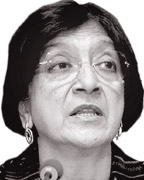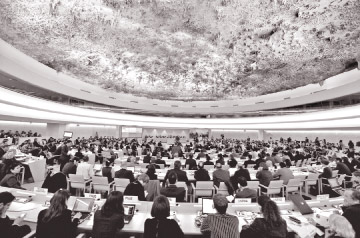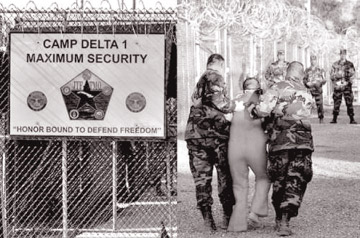UNHRC cracking under overbearing weight of Navi Pillay
 H. L. D. Mahindapala H. L. D. Mahindapala
UNHRC is stuck in a crisis of its own making. It has begun to crack
under the watch of Ms. Navi Pillay, the UN High Commissioner. It is time
for her to get her act together and hold the scales evenly to preserve
the image of the UNHRC as a credible institution for all the nations to
rally round it.
The first ominous crack came when Israel walked out virtually telling
Ms. Pillay to fly a kite. This is the first time that a nation has quit
the UNHRC. Whether we like its politics or not, Israel has been the
first island of democracy -- and still is -- in the sea of authoritarian
Middle East.
The "Arab Spring" is yet to put down its tap roots deep into the soil
and prove that democracy is there to stay and grow. At the other end, is
N. Korea, a rogue state armed with nuclear weapons, asking the UNHRC to
shove its Darusman report -- yes, it's same man who wrote the long
distance report on Sri Lanka -- on human rights in N. Korea up the
insensitive nose of UNHRC.
Even the pleadings of US, Irael's best ally, could not persuade
Israel to come back. As for N. Korea, Ms.Pillay knows that it would
rather drop its latest nuclear bomb on Geneva rather than give in to the
terms laid down by UNHRC. So UNHRC is assailed from the two extremes --
and Ms. Pillay can do nothing.

NAVI Pillay |

YASHUSHI Akashi |
Even if she sends her adverse reports condemning N. Korea to the
Security Council urging the Secretary-General to take action, China is
there to exercise its veto against Ms.Pillay. One may not agree with 99
per cent of N. Korean politics but it can be argued that of the
remaining 1 per cent half of it is right in the description of Ms.
Pillay as a factotum of the Western powers. And the other half too is
equally valid in that it warns the big powers that small nations need
not surrender to the cynical games of the West played to oppress other
people by using human rights.
Overall, this means that the first serious signs of UNHRC facing a
crisis of credibility among the nations are not likely to go away unless
Ms. Pillay decides to change directions and take into account
alternative voices that are pressing her to note that human rights is
not the private enterprise of the US with exclusive property rights to
run its self-serving agenda. When Israel and N. Korea -- not to mention
those in the middle like Sri Lanka -- attack UNHRC then it means that
there is something rotten in the state of Navi Pillay's domain in
Geneva. It questions the validity of UNHRC as a neutral and viable
instrument to protect human rights, peace and stability.
Power politics
At the heart of the crisis facing the UNHRC is the issue of
credibility. And right in the centre of credibility stands Navi Pillay
looking dazed with the right, left and centre hitting her middle. Her
handling of Sri Lanka exposes her partisan role which is dragging UNHRC
into a hole dug with her own hands. She has only to read the UNHRC's
voting record on Sri Lanka in the post-conflict period to realize the
erratic and unprincipled politics, swinging irrationally from
congratulations at first and then to condemnation next.
|

One of the UNHRC sessions |
Isn't this symptomatic of a dysfunctional institution run by whims
and fancies of an inconsistent head who does not know on which side of
human rights she should be in? UNHRC is meant to operate on the highest
principles of morality to monitor, protect and preserve human rights on
a global scale. Human rights cannot be sustained on immoral and partisan
power politics. Rightly or wrongly, UNHRC is cracking and going nowhere
because it is head has lost her head.
The emerging cracks indicate that Ms. Pillay cannot achieve the goals
of UNHRC if she continues to go about it the way she is heading now. She
is lurching from crisis to crisis within the UNHRC because she has
abandoned morality for power politics. Sri Lanka is the best example.
When the first voting on Sri Lanka took place in 2009 Sri Lanka won
hands down. It won on merit. Power politics did not impact forcefully in
that vote in 2009. Without America steering the anti-Sri Lankan
resolution the just and popular will of the 47 countries represented in
the UNHRC, including that of India, was expressed freely and Sri Lanka
was congratulated for defeating terrorism, the scourge of our time, and
for restoring democracy, the highest political goal of our time.
The declared aim of American foreign policy too is also to achieve
two objectives: 1. eradicate terrorism globally and 2. restore
democracy. On both counts America should have been on the side of Sri
Lanka. It is against the declared objectives of American foreign policy
to pursue Sri Lanka ruthlessly for achieving what it has failed to
achieve, for instance, in Iraq.
|

Guantanamo Bay prison, Cuba |
The first vote of congratulating Sri Lanka in 2009 was the most
realistic and justifiable decision that any human rights organisation
could have arrived at, particularly in the light of rescuing 300,000
victims of Tamil Tiger terror used as a human shield. But when power
politics came into play UNHRC turned topsy-turvy. Morality had nothing
to do with it. UNHRC turned against Sri Lanka only on cynical power
politics.
Besides, the most commendable humanitarian achievement of the Sri
Lankan victory has been in the total cessation of mounting death toll.
Massive scale violations of human rights can be avoided only by either
not going to war or by ending a war. It was the Tamil leadership that
declared war in the Vadukoddai Resolution of 1976 and decided to opt for
a military solution which ran for 33 years -- from 1976 to 2009 --
making it the longest running in Asia.
It is the Sri Lankan government that ended the war. Even India, with
its superior forces, failed to end the war with its Indo-Sri Lankan
Agreement and IPKF. When Sri Lanka achieved what India couldn't -- and
even the international community couldn't with its Oslo Agreement -- why
should they gang up against Sri Lanka for ending the war that ended the
deaths of thousands?
UNHRC Resolution
Of course, the argument of India and US, as stated in the UNHRC
Resolution, is that Sri Lanka should have "ensured that any measure
taken to combat terrorism complied with their obligations under
international law." This argument is laudable. But can all those,
pointing a finger at Sri Lanka on this count give an example of how
anyone of them fought and ended their wars against enemies of their
states by complying unerringly with their obligations under
international law? If they can't what justification is there for them to
accuse Sri Lanka of not doing what they have never done, or can never
do, with the best will in the world?
On what moral grounds can they accuse Sri Lanka in any forum of not
complying with international obligations when they cannot -- and have
not -- complied with the international norms they have set for Sri
Lanka? This charge of not complying with the international obligations
is levelled against Sri Lanka by the two worst violators of this
standard -- India and US. Not surprisingly, events took a nasty turn
against Sri Lanka only after US took charge of steering the resolutions
against Sri Lanka after the shock of UNHRC congratulating Sri Lanka. All
those running behind US know that the dirtiest wars of the 20th century
-- from El Salvador to Vietnam -- have been fought by US.
In fact, President Barack Obama, when he came into office changed his
election promise and announced the new policy of "looking forward to the
future" without going back the dirty past. He refused to even dismantle
the notorious Guantanamo concentration camp. After toppling Saddam
Hussein ten years ago America has failed to bring peace or
reconciliation to that ill-fated nation that has changed the local
terrorists for foreign terrorists. This is like changing pillows for a
headache.
Instead of reconciliation Iraq continues to blow up in sectarian
violence. The latest occurred last week when a part of Baghdad was blown
up in an anti-American strike. This proves that foreign formulas do not
work according to their theories. On the contrary, Sir Lanka, operating
on its home-grown formulas, is well on the way to recovery and
reconciliation.
Foreign policy
Its achievements in peace time is as remarkable as its achievement in
war time. So why isn't that policy "looking forward to the future"
forgetting the past applicable to Sri Lanka? If US wants to play the
game of finger-pointing then Sri Lanka too can play the same game by
throwing in the face Uncle Sam all the wrecks and remnants of its dirty
wars in which children ran naked in the streets of Vietnam burning from
raining napalm bombs. Have the moralists pointing a finger at Sri Lanka
forgotten those agonising images?
The most unacceptable and immoral turn came from India. India must
take responsibility for aiding and abetting the Tamil Tiger terror
unleashed on Sri Lanka that led to violations of human rights. But the
Yin-dian amnesiacs take on the holier-than-thou pose of political sadhus
and blame Sri Lanka for their short-sighted stupidity? India must take
responsibility not only for the failed foreign policy of arming,
training, financing, promoting and exporting terrorism to Sri Lanka and
the subsequent military disaster of its IPKF sent to correct the foreign
policy that boomeranged on Delhi but also for the current anti-Sri Lanka
campaign waged globally and at the UNHRC.
India's first memorable export to Sri Lanka was the Buddha. But India
will be remembered more for its next export: Mahabharata. Yin-dia is the
only friend that has stabbed Sri Lankans in the back each time they try
to stand up. Under the Gandhi-Nehruvian morality, when India stood tall
in the middle of the Big power politics at the height of the Cold War
and spearheaded the Non-aligned Movement, she was a beacon and a haven
for smaller nations seeking peace, justice and fairness. But this noble
ideal has been destroyed by India's misalignment with Big Power
politics. It may serve India in the short term but in the long term
India is taking a risk that is going to threaten her geo-political
strategies. The ultimate guarantor of India's security is not long
distance shady allies but reliable and friendly neighbours.
But India has abandoned its principled roots and decided to be an
integral part of the US bandwagon lending a hand to Western
neo-imperialist agenda. It's a risky gamble that threatens the security
of not only India but the entire SAARC region. India must think twice
before it gets entangled further in this risky gamble. The stature of
Ms. Pillay too would have risen to the skies had she decided to take a
moral stand which could be achieved only by her neutrality. The morality
she quotes is only a fig leaf to cover her nakedness.
Yashushi Akashi summed up the new ground reality in Sri Lanka aptly
when he said that "Japan was not ready to go with the human rights
stands of other nations, ignoring the objective realities in Sri Lanka."
Speaking to media in Tokyo on March 13, the former peace envoy to Sri
Lanka said that, “it is rather unfair for some developed countries, who
have much more resources than Sri Lanka, to express impatience with Sri
Lanka and its development; but this is not fair and this is not
objective.” (Daily Mirror -- March 15, 2009)
Post-conflict developments
The doomsday scenario painted at the UNHRC is not the reality.
Akashi's assessment is a non-partisan eye witness account of the
post-conflict developments in Sri Lanka which contradicts the doom and
gloom picture painted by NGOs and the media. If, for instance, Sri Lanka
is heading for the doom predicted by the NGO pundits -- they never saw
anything but doom in Sri Lanka -- why is India investing mega-millions
in Sri Lanka? India knows the ground reality as well as Japan. And yet
India is deliberately pushing an anti-Sri Lankan line. Sure, India has
to walk a fine line between its domestic and foreign demands. But does
this mean that India should sacrifice its most strategic and
indispensable neighbour needed to protect its exposed southern flank?
As for Ms. Pillay, she has nothing to lose except her reputation and
credibility as the guardian of human rights if she insists on going down
the current path of rejecting the new realities rising constructively in
Sri Lanka. Despite all the hostile propaganda demonizing Sri Lanka it is
not going to end up like the Mayan calendar. Sri Lanka has fought and
won bigger and mightier attacks than this. It is the future of UNHRC and
its effectiveness as an instrument to protect human rights that is at
stake.
So will Ms. Pillay stand up to save UNHRC and its ideal objectives or
will she obediently follow the other skirt worn by Eileen Chamberlain
Donahoe, the American ambassador to UNHRC? |







